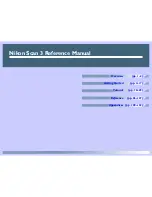
VMware, Inc.
99
Chapter 5 Configuring Package Parameters
MSIRequireElevatedPrivileges
The
MSIRequireElevatedPrivileges
parameter
applies
to
Windows
Vista
and
specifies
elevated
privilege
requirements
for
the
MSI
database.
Most
users
who
log
in
to
Windows
Vista
have
restricted
privileges.
To
install
MSI
packages
for
all
users
who
must
have
shortcuts
and
file
type
associations,
the
users
must
have
elevated
privileges.
ThinApp
sets
an
initial
value
of
the
MSIRequireElevatedPrivileges
parameter
that
marks
the
MSI
database
as
requiring
elevated
privileges.
If
your
system
is
set
up
for
UAC
prompts,
a
UAC
prompt
appears
when
you
install
an
application.
The
parameter
works
only
when
the
MSIFilename
parameter
requests
the
generation
of
a
Windows
Installer
database.
Examples
You
can
modify
the
MSIRequireElevatedPrivileges
parameter
to
block
the
UAC
prompt
and
the
installation
across
all
computers.
[BuildOptions]
MSIFilename=<my_msi>.msi
MSIRequireElevatedPrivileges=0
MSIUpgradeCode
The
MSIUpgradeCode
parameter
specifies
a
code
for
the
MSI
database
that
facilitates
updates.
When
two
packages,
such
as
the
version
1.0
package
and
the
version
2.0
package,
have
the
same
upgrade
code,
the
MSI
installer
detects
this
link,
uninstalls
the
earlier
package,
and
installs
the
updated
package.
The
capture
process
generates
a
random
upgrade
code
based
on
the
inventory
name.
To
ensure
that
the
MSI
database
versions
have
the
same
upgrade
code,
keep
the
same
inventory
name
across
versions
of
the
MSI
wrapper.
For
information
about
the
inventory
name,
see
“InventoryName”
on
page 100.
The
parameter
works
only
when
the
MSIFilename
parameter
requests
the
generation
of
a
Windows
Installer
database.
Do
not
modify
the
UpgradeCode
value
unless
the
new
value
is
a
valid
GUID.
Examples
The
capture
process
can
create
an
MSI
file
with
D89F1994
‐
A24B
‐
3E11
‐
0C94
‐
7FD1E13AB93F
as
the
upgrade
code.
[BuildOptions]
MSIFilename=mymsi.msi
MSIUpgradeCode={D89F1994-A24B-3E11-0C94-7FD1E13AB93F}
MSIStreaming
The
MSIStreaming
parameter
determines
the
use
of
.cab
files
that
can
affect
application
performance.
ThinApp
sets
an
initial
value
that
compresses
the
package
files
in
a
.cab
file
and
makes
it
easier
to
move
the
file.
The
.cab
file
is
in
the
MSI
file.
Examples
You
can
modify
the
MSIStreaming
parameter
to
avoid
a
.cab
file
when
it
slows
down
the
installation
process
for
applications.
You
can
distribute
the
MSI
file
and
individual
executable
files
in
the
/bin
directory
to
install
the
application.
[BuildOptions]
MSIStreaming=1
Содержание THINAPP 4.6 - MIGRATING APPLICATIONS TECHNICAL NOTE
Страница 38: ...ThinApp User s Guide 38 VMware Inc...
Страница 114: ...ThinApp User s Guide 114 VMware Inc...
Страница 136: ...ThinApp User s Guide 136 VMware Inc...
Страница 140: ...ThinApp User s Guide 140 VMware Inc...
Страница 146: ...ThinApp User s Guide 146 VMware Inc...
















































